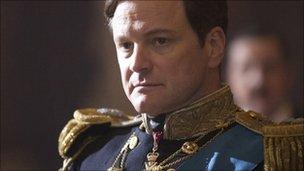The King's Speech: Royal broadcasts in the BBC archives
- Published

The King's Speech stars Firth as the stammering King George VI
The British film, The King's Speech, nominated this week for seven Golden Globes, tells the story of George VI's battle to overcome a terrible stammer.
He was a reluctant king, thrust into the role when his elder brother, Edward VIII, abdicated to marry the American divorcee, Wallis Simpson.
Edward VIII, smooth and charming, would have found the role of King so much easier as the BBC Archive website makes abundantly clear.
A number of his speeches, uploaded this month, showcase his accomplishments as a public speaker.
The earliest recording dates from the opening of British Empire exhibition in Wembley stadium in April 1924 - the scene of his younger brother's greatest humiliation the following year.
In the film, actor Colin Firth gags, blinks and lowers his head as he portrays the future king's paralysis in front of the microphone, as he was broadcast across the nation and the Empire in October 1925.
According to the British Library's spoken word recording curator Stephen Cleary, this speech almost certainly does not exist in recorded form.
Long pauses
The only speech by George VI on the BBC website is the triumph that forms the culmination of Tom Hooper's film - the King's Speech rallying the nation on the outbreak of war in 1939.
The first thing that strikes you about his diction is his difficulty with the letter R.
"In this gwave [grave] hour… perhaps… the most fateful in our histowy [history], I send… to evewy household of my people both at home and overseas… this message."
On the word "message", his lisp also comes across loud and clear.
The address is almost six minutes long. As it progresses, it becomes clear that the King's frequent pauses are not just rhetorical, but the result of his stammer - overcome to a degree, thanks to the help of speech therapist Lionel Logue, but always threatening to gain control.
A British Pathe clip of the King speaking at the opening of an exhibition in Ibrox Park, Glasgow, external a year earlier (1938) was even less fluent. The king's pauses, moments of concentration when he closes his eyes, and his occasional false starts, are reported to have moved Colin Firth to tears.
Edward VIII's broadcasts, by contrast, delivered in a high tenor voice that sometimes sounds almost feminine, exude self-confidence. He makes the occasional fluff, but is not thrown off course - he picks the line up, sometimes with a short "mmm" attached to the first syllable of the next word.
"I don't think he got pleasure from it," says Philip Ziegler, biographer of Edward VIII. "He always disliked public appearances, even though he knew he could do it - he was a good orator, and a good off-the-cuff impromptu speaker."
Loud thump
There is one recording on the BBC Archive website where we hear George V, father of Edward and George VI. That is the recording of the opening of the British Empire Exhibition in 1924, mentioned above, where Edward (then the Prince of Wales) speaks first, followed by his father.
This is in fact the first broadcast by George V, whom Philip Ziegler describes as an "extremely good" public speaker. He was at first "rather horrified" by the idea of broadcasting, but acquired a taste for it and started the tradition of recording an annual Christmas message, which has been continued by subsequent monarchs.
In the film, George V is played by Michael Gambon.
"George V speaks in tones as warm and sweet as plum pudding," writes Carrie Rickey in the Philadelphia Inquirer. George VI, she goes on, "speaks as if with a mouth full of plum pits."
While the King's Speech depicts a very tense relationship between the King's sons, Philip Ziegler says they were very close until about the age of 30. He rejects the idea that Edward would have drawn any satisfaction from possessing better PR skills than his younger brother.
The strain in Edward's voice is very evident in his most famous broadcast speech - his abdication speech - but he still carries it off well.
This particular broadcast is one that he was very keen to make. "Given half a chance he would have made it longer," Philip Ziegler says.
Many of the great and good thought he should not have been given the chance to do it, and there has been speculation that a loud thump, which occurs after a few words of introduction by Sir John Reith, was made by the BBC director general slamming the door as he left the studio.
In fact it was the ex-king, soon to be Duke of Windsor, banging his leg against the table.
- Published17 January 2011
- Published6 December 2010